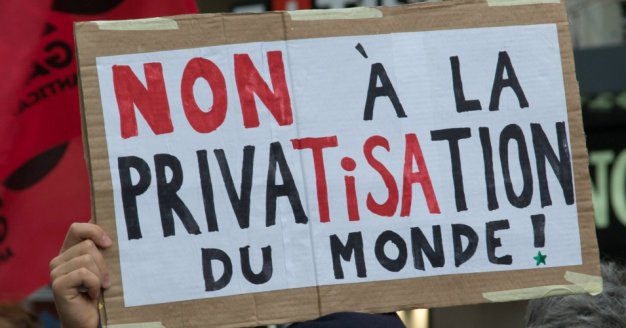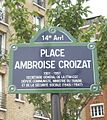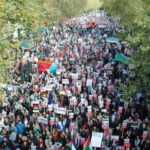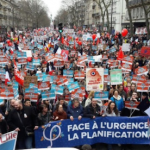THE WHOLE LEFT DISCUSSED THE PRESIDENTIAL AND LEGISLATIVE ELECTIONS THESE LAST MONTHS – WHAT KIND OF SOCIETY WILL WE OPT FOR IN 2017?
In the discussions about the coming elections[1] the left showed its weaknesses, contradictions and differences, but it also sensibly decided by majority votes to support Jean-Luc Melanchon[2] for president. This was an important step forward . It was taken by the parties of the Front de Gauche (FdG)[3] – the French Communist Party (PCF) notably – and by ‘Ensemble’[4].
This is not the end of the political battle however. Those who support Melanchon now need a common platform outside France Insoumise – the latter being that of Jean-Luc Melanchon. France Insoumise draws together as many political organisations of the left as possible, but these cannot express themselves individually within it. This has the effect of silencing even the FdG. Besides, the charter of France Insoumise is a bit rigid: people within it must campaign under the France Insoumise banner and support its programme ‘L’avenir en Commun’.
This makes other demands as well, ways of voting internally, ways of integrating the campaign’s finances, etc.Alongside the differing political views in matters of European and international policy, this makes supporting Jean-Luc Melanchon (JLM) less than a straight forward and natural affair.
Matters became clearer in November 2016 when the militants of ‘Ensemble’ were called to vote. It was the first time they voted on anything since their creation (2013). Up to recently, their internal decisions had been by consensus; now they had to vote on three options: 1. To support JLM as part of the construction of a wider alliance, 2. To sign up to France Insoumise, or 3. To wait for better conditions. The first option got the most support, with 42%. This was a success, considering other difficulties that had accumulated previously.
Then it was the turn of the militants of the French Communist Party (PCF) to vote. They opted for JLM by 53.6%, with the proviso that the PCF would retain it critical and constructive autonomy. The second option looking for an independent Communist candidate got only 46.4%. The decision to support JLM had not been entirely expected because the National Conference of the PCF on 5 November 2016 had decided to stand a Communist candidate, even against the advice of Pierre Laurent[5] who had favoured JLM.
This shows the [political] strength of the militants at the base. For months on end, this base was instrumental in all the street struggles against the reforms of the Labour Law[6]. It was instrumental also in all the mobilisations ‘unitaires’, in the ‘Convergence des Luttes’ and in the ‘Nuits Debout’. It was in everything where collective ways to intervene were found. And it created new ways to resist against the austerity policies of the Hollande’s government[7].
The work previously carried out by the ‘Appel of the 100’[8] and ‘the Common Front’[9] allowed for the incorporation of the Trade Unionist and Academic political portions of the left. These never lost sight of the need to create ever wider movements and more united struggles. They insist on another choice of society, another sharing of the wealth, a new economic, political and social project.
Whilst the left is steadily reorganising in this way, the crisis of the Socialist Party deepens by the day. Eighty Socialist MPs decided not to stand in the coming Legislative elections. Some step down because they are not getting younger, but others look in the direction of their constituencies for political reasons. They drop the kind of national role that earns them nothing but humiliation and contempt. They feel that their role of representatives is being cancelled by a government that imposes its policies by force, and with measures that they do not believe in: The reform of the Labour law is an example, and the revocation of citizenship for dual-nationals[10] is another.
When Francois Hollande decided not to stand again for president in 2017, Manuel Valls[11] was chosen instead. The anger and disgust expressed by the 80 Socialist MPs is shared by a large part of the Socialist militants who do not think that their Party stands for any socialist value. Even the way Francois Hollande stood down carried an evocation of abandonment, a heavy realisation of failure.
Since Manuel Valls stands for President, he had to resign his post of Prime Minister[12]. To the Socialist militants, this change felt like some kind of aggression, on the part of this “Sarkozy bis” who divided the left with his attacks on dual-nationals and his theory of “two irreconcilable lefts”. Where is the decency in him standing for the left? Even Martine Aubry[13] had to say that: “If there are two lefts, it is because one has become right-wing”.
December preparations for the January Socialist Primaries:
Now that Francois Hollande has stood down, the Socialist Party tries to mobilise its supporters for the January primaries. A National Convention was launched on 3.12.16 under the grand title of “La Belle Alliance Populaire”, but only 3,000 militants showed up against the 10,000 expected. Now the Party reckons it may not even muster 1.5 or 2 millions for the Primaries. Now a new Socialist candidate has decided to stand: Vincent Peillon, ex-Minister of Education, of whom nothing was heard these last two years. He will be the compromise between the Party’s right wing of Manuel Valls, and Arnaud Montebourg, said to be of the left.
The Presidential primaries are set to happen on 22-29 Jan 2017 with the participation of the Socialists, the Greens and the PRG (Parti Radical de Gauche). These groups stand seven candidates in all. Four candidates for the Socialist Party: Manuel Valls, Arnaud Montebourg, Benoît Hamond and Vincent Peillon. Two for the Greens (who broke from Europe Ecology and the Greens EELV which stands its own candidate): Francois de Rugy and Jean-Luc Benhamias. And one for the PRG: Sylvia Pinel. This regrouping shows how very narrow the Belle Alliance Populaire is in reality. Contrary to its claims, it is only the Socialist Party and a few parties with little weight. This is not helped by the refusal to let Gerard Fichoche[14] stand as well, a Left winger against whom the Socialist Party did everything to stop him gathering the necessary signatures.
Neoliberalism, the Socialist Party and Macron:
There is a situation of profound crisis in the Socialist Party. Hollande’s liberal policies turned the citizen into a mere economic cog. Those policies have turned society into an immense market driven by the sole aim of increased productivity, profits and competition. The social question has disappeared from the order of the day. The economic question is supposed to resolve everything – unemployment included. Although unemployment goes down on the official charts, it continues to gnaw at society, whilst poverty spreads constantly further, with precariousness and inequality.
And let’s us not forget how the government’s security measures attack the basic liberties. The State of Emergency continues, having been renewed. To maintain and guarantee its domination, the capitalist class arms itself against any form of citizen resistance. It is with the same reasoning that capitalism conducts its wars and intervenes military as part of Nato. This is how it has intervened for years in Africa, as in Mali, in the Middle East and elsewhere.
Now Emmanuel Macron[15] has decided to stand for President for the Socialist Party. He created his ‘En Marche’ movement for this purpose. He was once a close Socialist government’s associate to Manuel Valls. Now he is a media mogul keen on ‘modernity’; the providential man in a world of no more difference between Left and Right.
Mr Macron has two Laws in his name. They were forced through the National Assembly, resulting in August 2015 with the privatisation of transports. The “Macron Bus” refers to a situation where bus operators from the rest of Europe received preferential tariffs to become implanted and compete against the nationalised SNCF in the transport market. Hardly 15 months had passed than 50% of these operators had gone. One of them, Megabus of the United Kingdom, has just declared its closure and sacked 175 workers!
The preparations of the capitalist class:
All this allows the capitalist parties to gain ground and forge ahead. From their own Primaries, there emerged the unexpected presidential candidate Francois Fillon[16] with more than 4 millions votes. He represents the traditional conservative and Catholic right wing, opposed to single-sex marriage and abortion, and not very different from the National Front. His programme attacks the French Social Security system, the Trade Unions and the CGT in particular. He wants to reduce the 100 billion Euros public expenditure bill. He wants 500,000 sacked from the public sector. He blames the unemployed and their benefits. He wants new conditions for immigration and the revision of the right to become French by birth. He wants 39 hours week instead of 35, without any salary rise. He will abolish inheritance tax, reduce corporation tax and raise the pension age to 65.
In 2015, the regional assemblies were reorganised via a territorial reform. The way this was passed in the National Assembly left the victory to the right[17]. Where are we going if we leave the terrain to the right and extreme-right in this way? Now there are important retreats happening in the regions, particularly in the fields of health, transport and culture. New regional teams have become formed, applying everywhere the same policy: reduction of public spending, reduction of grants to the local associations and councils, sackings wherever possible and the elimination of the subsidies once used for the young people. There is more funding however for private enterprise and private education. And no more troubling with environment rules.

The bourgeois press is already fully behind Francois Fillon. He tops the polls. But not all agree however: the IFOP[18] finds that 72% of the population is greatly worried by Mr Fillon’s ultra-liberal programme.
Fillon’s programme reverses most social advances won to date by working class struggles, like the French Social Security system.
The deep concern that people feel about what is happening to the Social Security in France is partly reflected in the success of the film “La Sociale”[19] by Gilles Perret.
This film explains the origins of the Social Security system in France and its 70 years of post-war conquests. It was the Conseil National de la Resistance (CNR)*** that initiated, coordinated and implemented the comprehensive Social Security project[20]. The CNR was our Social Security system! It led to the ‘1945 Ordinance’ that instituted Social Security for all. This then led to the 1946 Laws that spread Social Security further, along with family allocations.
The latter we owe to the Communist Minister of Labour of that period, Ambroise Croizat[21].
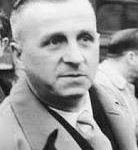
Ambroise Croizat placed himself at the service of others.
Although millions followed Ambroise Croizat’s coffin in Paris on 11 Feb 1951, official history has done its best to have him forgotten.
The principles of solidarity behind our Social Security system are threatened by its increasing privatisation. The first stage of Vall’s reform – on the so-called ‘minima sociaux’ – imposes cuts on the AAH disability benefits and on Aspa for the elderly.
Valls sees this reform as part of his “lutte contre l’assistanat”.
The solidarity principle behind the Social Security is threatened by other changes, like the reorganisation of the workplace for instance. The left must reassert its values. The aim of [having a role in] the 2017 election is not so decisive in itself. What is decisive is to work for the effective spread of the values of the left: its choice of society must be defined by a programme of economic and social transformations, whatever name is given to the programme. Decisive also is the struggle that needs to be had, to impose these values against the right and extreme-right that we repudiate.
Les Posadistes Aujourd’hui – 30.12.2016
**** In 1942, Jean Moulin was one of the main leaders of what was becoming the CNR. The CNR led and coordinated the resistance movements against German invasion, and against nazism. It regrouped press people, trade unionists, left-wing political parties (Communists and Socialists particularly) and others, opposed to the collaboration of the Vichy government. In 1945, the CNR saw to the setting-up of a national health insurance scheme for all. It nationalised gas, electricity and mines, as well as key industries and strategic enterprises. Editorial.
[1] Legislatives: 11 and 18 June 2017 – Presidentials: 23 April and 7 May 2017.
[2] Jean-Luc Melanchon, born 1951 Morocco. Joined the left of the Socialist Party in France. In 2008, formed the Parti de Gauche (PdG) on the Socialist Left. Member of the European Parliament in 2014. Stood for president in 2012 (got 11% votes). Founded France Insoumise in Feb 2016.
[3] Front de Gauche is an electoral federation. It includes the French Communist Party and the PdG. It includes also the Gauche Unitaire, as well as ex-members of the Anti-capitalist Party NPA, the Federation of Social And Ecological Alternative (FASE), Republic and Socialism, Convergences & Alternatives, the Workers’ Communist Party of France and ‘The Alternatives’.
[4] Ensemble-Mouvement pour une Alternative de Gauche, Ecololique et Solidaire. Formed in 2013. Regroups ex Communists, Trotskyists, Alternatives, Ecologists, Trade Unionists and alter-globalists.
[5] Pierre Laurent, born 1957. Took over as Secretary of the French Communist Party in 2010 from Marie-George Buffet. In December 2016, he was himself replaced by Gregor Gysi.
[6] The El Khomri reform relaxes the 35h week, makes it easier for employers to fire workers, and weakens the power of the Trade Unions. It was passed in parliament through the repeated use of Article 49.3 – a constitutional amendment that lends this kind of power to the Executive.
[7] Francois Hollande, born 1954. Leader of the French Socialist Party up to now. Became President of the Republic in May 2012. Will not stand again this April 2017.
[8] L’Appel des Cents: is an appeal launched on 1.5.2016 by personalities, socialist and communist leaders, Ecologists, intellectuals, Trade Unions, Associations, etc., so that the ‘citizens’ come forward, ‘erupt on the social stage’ and ‘start a public debate’.
[9] Le Front Commun is the solidarity organisation of ‘the 100’.
[10] The reform of the Labour Law was imposed constitutionally by article 49.3; the revocation of citizenship was cancelled after the withdrawal of a 49.3 threat.
[11] Manuel Valls, born 1962 Barcelona. Brought up in France. Socialist Home Affairs Minister in 2011. Socialist Prime Minister since 2014. Stepping down now to stand for President of the Republic.
[12] Valls was replaced by Bernard Cazeneuve.
[13] Martine Aubry: Born 1950. Was labour Minister under Socialist Lionel Jospin in 1997. In 2008, became Secretary of the French Socialist Party. Stood for President of the Republic in 2011 – beaten by Francois Hollande at the second ballot. She is very relatively of the Left. Editorial.
[14] Gerard Filoche said that he would fight back, like Corbyn.
[15] Emanuel Macron: Born 1977. Originally businessman and banker. Joined the Socialist Party in 2006. Became Economic Minister under Francois Hollande in 2012, and then Finance Minister. Resigned from the Valls’ government in August 2016. Now standing for President of the Republic, stealing a march on all the candidates of the Socialist Primaries.
[16] Francois Fillon, born 1954. Member of the Rassemblement Pour la Republique (RPR), then of the Union Pour un Mouvement Populaire (UMP), and then of ‘Les Republicains’ (LR).
[17] From the 22 original French regions, there are only 13 left. This was passed through parliament without local popular debates, or popular meetings. The government decides, and the MPs approve.
[18] IFOP – Institut Francais d’Opinion Publique.
[19] http://www.liberation.fr/france/2016/11/07/ambroise-croizat-pere-de-la-secu-a-l-honneur-dans-un-film_1526754
[20] A social security for all, with reimbursement for medical expenses, and unemployment benefits.
21] Ambroise Croizat: Born Jan 1901 in Savoie; died 10 Feb 1951. Deputy of the Third Republic and Minister of the Fourth Republic. Buried at Le Pere Lachaise.
